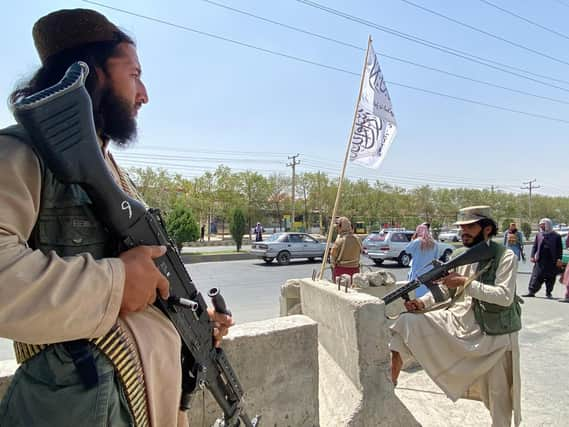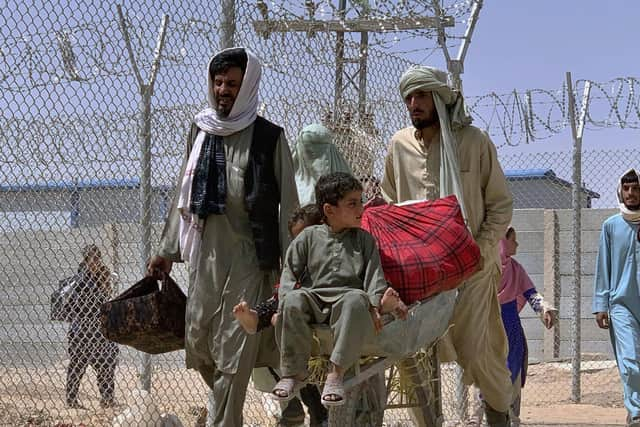Afghanistan's green shoots of hope lie trampled amid the rubble - Chris Bond


It was of a British soldier fixing a tattered kite on the bonnet of his jeep, surrounded by a crowd of children dressed in rags, who watched with excitement.
It sounds unremarkable and could easily go unnoticed but in Kabul back then small things could make big a difference.
Advertisement
Hide AdAdvertisement
Hide AdKite flying holds a special place in Afghan culture and for many years it was the main recreational escape for Afghan boys and men, only to be banned by the Taliban, along with television, music and cinema.


The soldier understood this and while politicians spoke loftily about the importance of “winning hearts and minds”, here it was in action.
This was back in September 2004, when I spent time with the Green Howards, part of the British peace-keeping mission in Afghanistan, covering the deployment for this newspaper.
The Green Howards made up roughly half the contingent of British armed forces in Afghanistan when I was there, working as part of the Nato-led International Security and Assistance Force.
Advertisement
Hide AdAdvertisement
Hide AdThey provided support to the interim Afghan government and its embryonic institutions, which involved everything from project management to diplomacy.
Kabul itself was a pauperised city, pockmarked with half-finished or abandoned buildings. And yet amid the rubble, green shoots were starting to appear.
British troops were involved in numerous health and education projects, working alongside NGOs and local elders. The captain of the battalion’s Civil Military Co-operation team took us to one of the main hospitals, where his men had helped build a kindergarten for the staff and children.
The next day we were taken to the Rahman Mena Girls’ School, where five new classrooms had been built to house the growing number of students. Under the Taliban’s draconian regime, girls were not allowed to go to school beyond the age of 10 and before the classrooms were built many of the 6,000 pupils were forced to study outside in searing heat.
Advertisement
Hide AdAdvertisement
Hide AdAt a ceremony to mark the opening of the new classrooms, I spoke to 11-year-old Nigina, who was, according to her teacher, one of the brightest pupils in her class.
Nigina told me she wanted to be a doctor when she was older. “I’m happy to have new classrooms. We are learning different subjects and history and science are my favourites,” she said, beaming with pride.
Contrast this hope and optimism with the terrifying and chaotic scenes that have unravelled over the past week. What we have witnessed is a human tragedy of Shakespearian proportions, one exacerbated by a litany of political miscalculations.
It’s easy to portray Afghanistan as a lawless, untamable land that answers only to the gun. But that is not the country that I, and many other foreign journalists, aid workers and diplomats, have encountered.
Advertisement
Hide AdAdvertisement
Hide AdYes, it is complex and contradictory but while the political situation has undeniably remained fractious, the country has, in its big cities at least, undergone great social and cultural changes.
And it is why President Biden’s speech defending the timing of the US withdrawal was as bemusing as it was wretched. Pulling troops out of Afghanistan hasn’t ended what Biden dubbed a “forever war” but merely paved the way for a new one.
This is an epoch-defining moment for the West, whose standing in the world has been diminished not just strategically, but morally.
MPs on all sides have rounded on Boris Johnson and the Government’s handling of events. They were scathing in their criticism and they were right to be.
Advertisement
Hide AdAdvertisement
Hide AdThe US and Nato forces have cut their losses and run. That is the truth of it. And, yet again, it is ordinary Afghans who will bear the brunt of whatever comes next.
Today’s Taliban may be more media savvy and its leaders eager to avoid becoming international pariahs, but there is a disconnect between the rhetoric uttered by its spokesmen and the actions of its grizzled hardline military commanders on the ground.
As for claims made in the group’s first press conference, that the rights of women in Afghanistan will be respected “within the framework of Islamic law”, they sounded like an exercise in obfuscation.
Let’s not forget the last time the Taliban were in power women were publicly whipped in the street if they exposed even their ankles.
Advertisement
Hide AdAdvertisement
Hide AdThe immediate focus now must be on evacuating Afghans and their families who put their lives at risk to help the Allies.
But what about those that remain? What will happen to girls like Nigina in the future?
Will they be allowed to follow their dreams and become a doctor or will they, once the world’s glare has turned elsewhere, be coerced into a loveless marriage and a life of drudgery? And will the sight of thousands of brightly coloured kites being flown from the craggy summits of hilltops once again become a thing of the past?
We don’t know for certain but the outlook is grim. This is the legacy we have bequeathed the people of Afghanistan – and that is perhaps the cruellest tragedy of all.
Comment Guidelines
National World encourages reader discussion on our stories. User feedback, insights and back-and-forth exchanges add a rich layer of context to reporting. Please review our Community Guidelines before commenting.